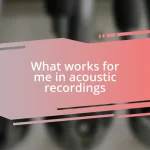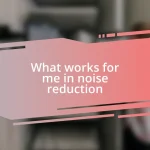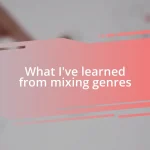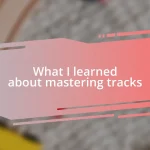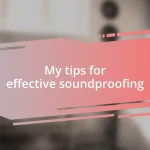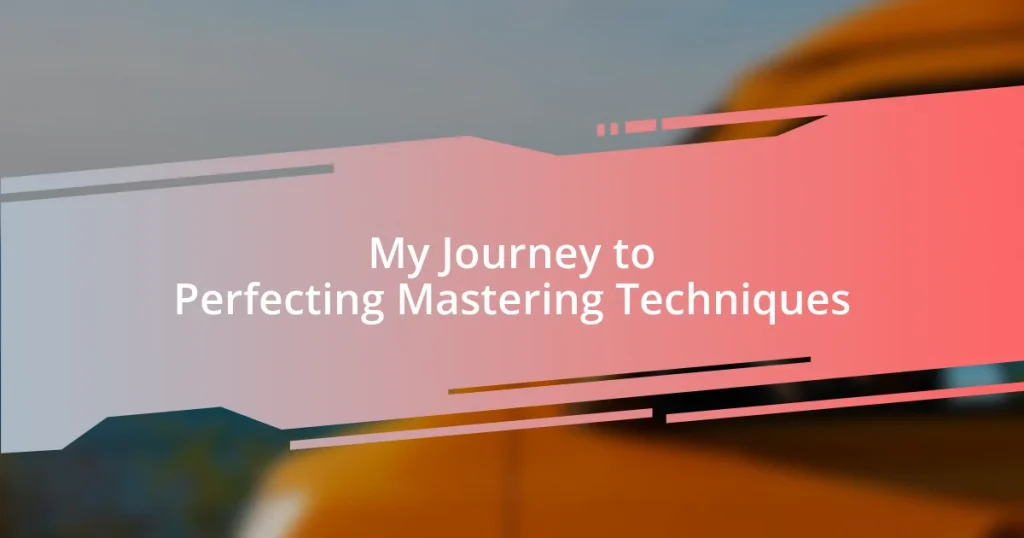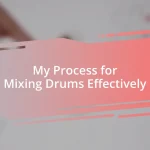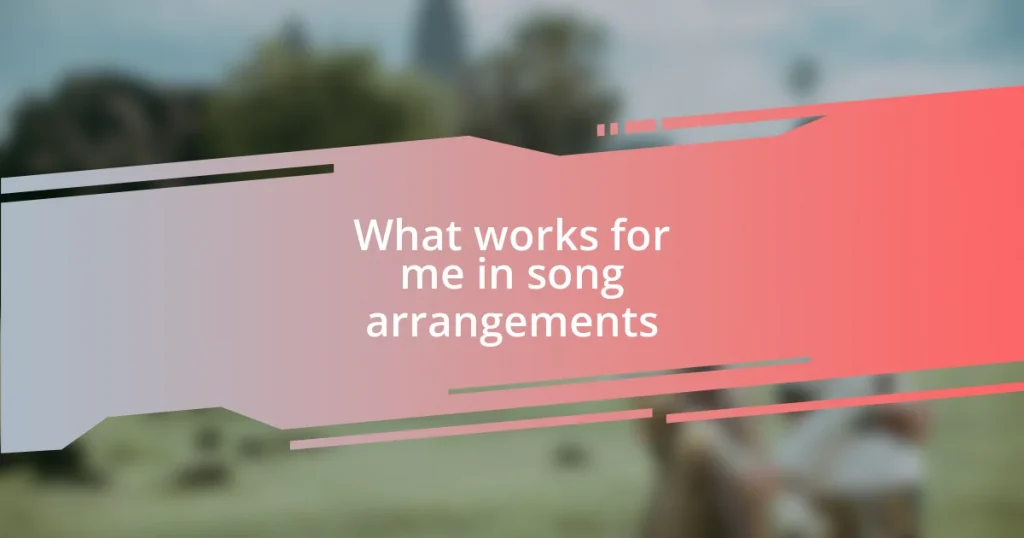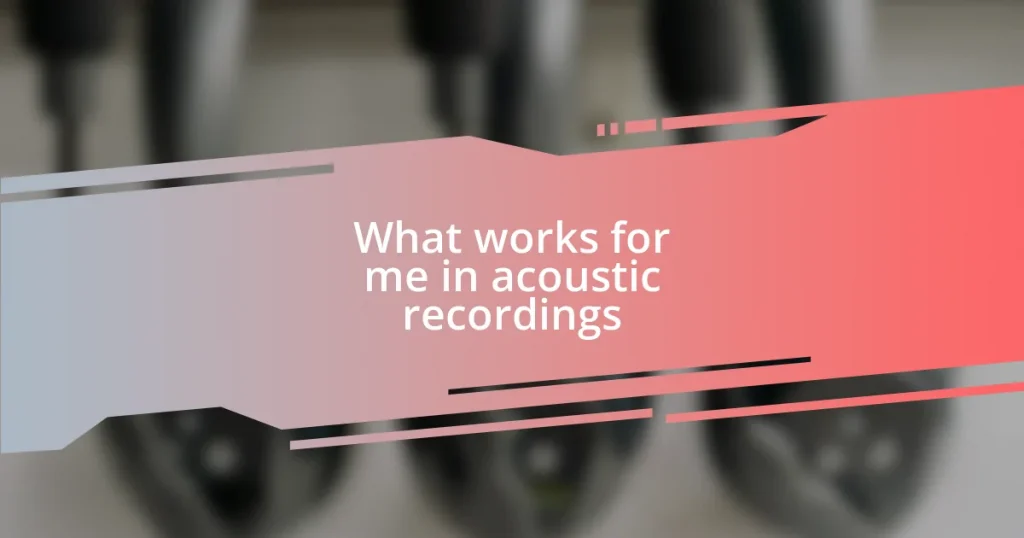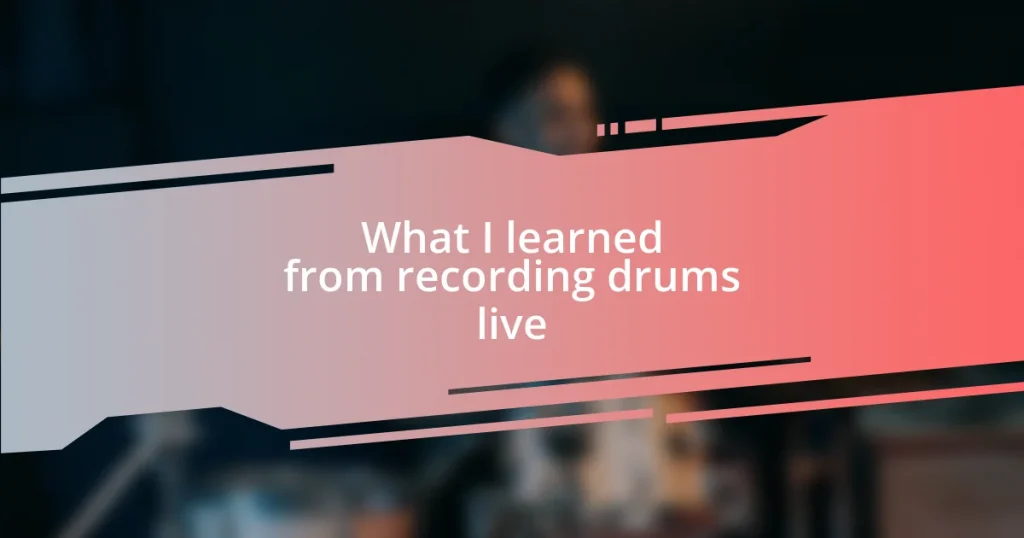Key takeaways:
- Mastering techniques involve not just technical skills, but also understanding dynamics, emotional expression, and the balance of elements for a cohesive sound.
- Consistent practice, feedback from peers, and learning from industry experts are crucial for improvement and discovering new perspectives in mastering music.
- Evaluating progress through self-reflection and feedback allows for personal growth, adaptability, and the enhancement of creative techniques.
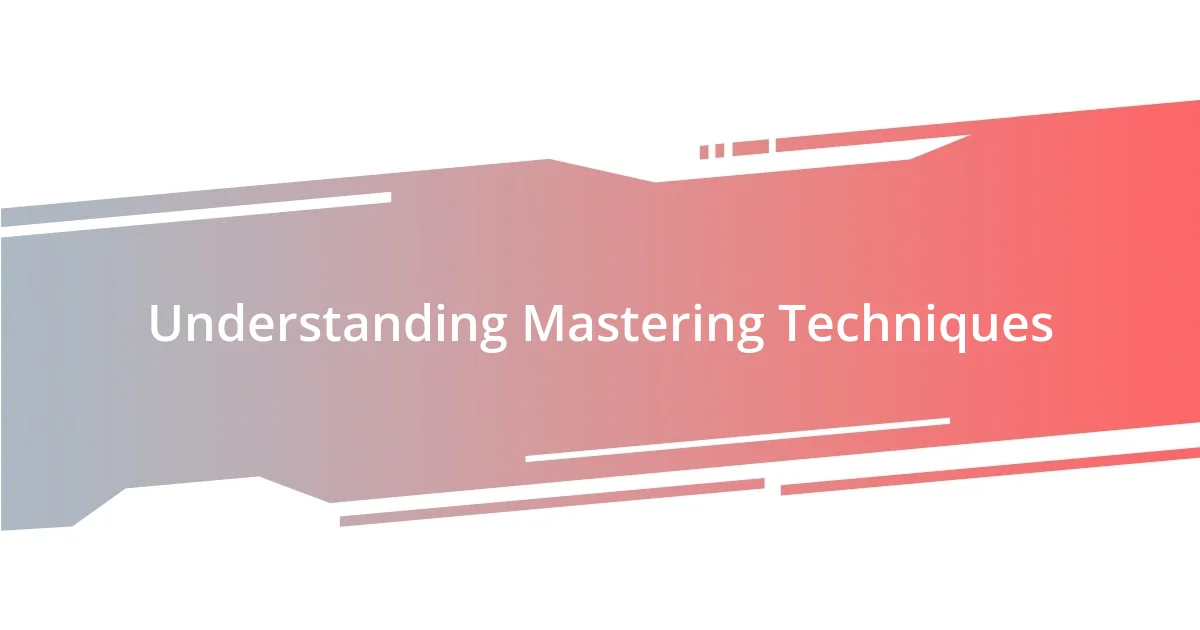
Understanding Mastering Techniques
Understanding mastering techniques is like peeling back the layers of an onion; each layer reveals something new and essential. I remember the first time I tried to master a piece of music; I focused solely on hitting the right notes. It wasn’t until I delved into the nuances of dynamics and expression that I realized mastering isn’t just about accuracy—it’s about invoking emotion and telling a story. Have you ever listened to a performer and felt like they transported you to another world? That’s the magic of mastering techniques.
As I explored various mastering techniques, I noticed that each approach changed not just the sound, but also the emotional impact of the piece. For instance, using compression strategically can tighten the overall mix, giving it a polished feel. I still recall the excitement I felt the first time I applied it correctly—it was as if the music suddenly came alive. This interaction between technique and emotion truly fascinates me and makes me wonder: what emotions are you trying to convey in your work?
Focusing on mastering techniques also means understanding the balance and placement of elements in a mix. There’s this moment when you finally find the right equalization that makes everything click together. It’s like a lightbulb moment where everything sounds fuller and more cohesive. Have you experienced that sense of satisfaction? For me, it felt like the culmination of many hours of trial and error, reminding me that mastering is as much a journey of discovery as it is a technical skill.
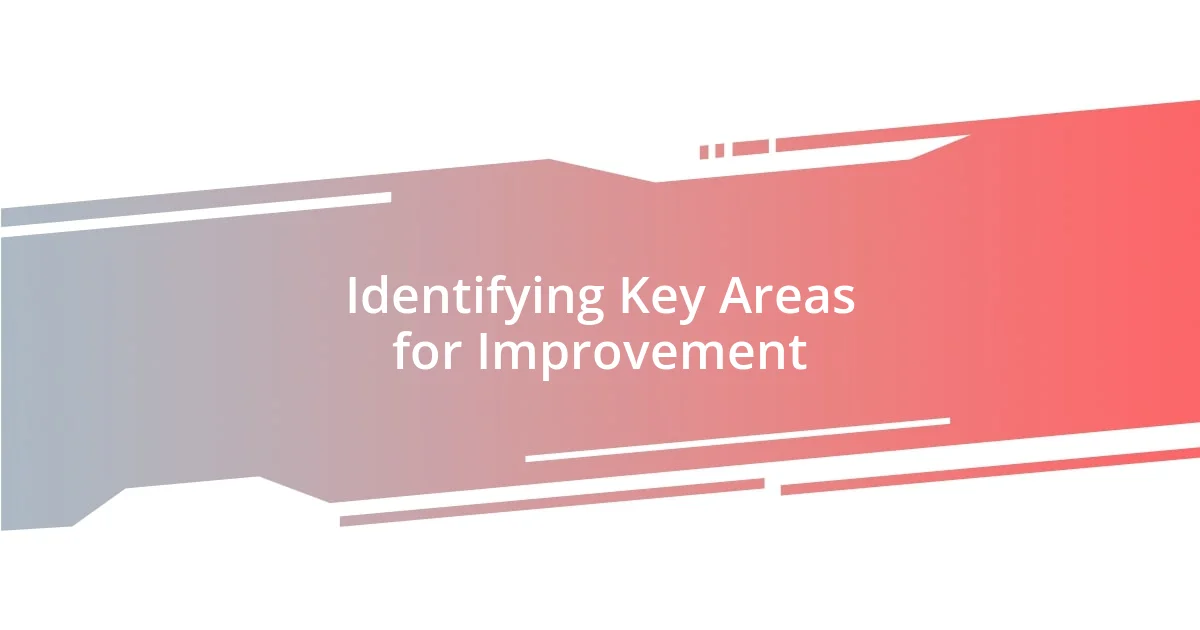
Identifying Key Areas for Improvement
Identifying areas for improvement is crucial in mastering techniques. I remember a time when I attempted to blend different instruments in my composition but ended up with a muddy mix. Recognizing that the frequencies were clashing rather than complementing each other was a turning point. It illuminated the need to assess each component meticulously, which is essential for achieving clarity in your work.
Here are a few key areas to evaluate in your mastering process:
- Frequency Balance: Are certain frequencies overpowering others?
- Dynamics Control: Is the overall dynamics of your piece working effectively?
- Panning and Spatial Placement: Are elements correctly positioned in the stereo field?
- Volume Levels: Are the different tracks balanced, ensuring none dominate unnecessarily?
- Emotional Connection: Does your mix evoke the feelings you intended?
Reflecting on these aspects can guide your next steps and highlight where growth is needed. It’s amazing how small tweaks can lead to significant improvements in your music, making it feel more whole and polished.
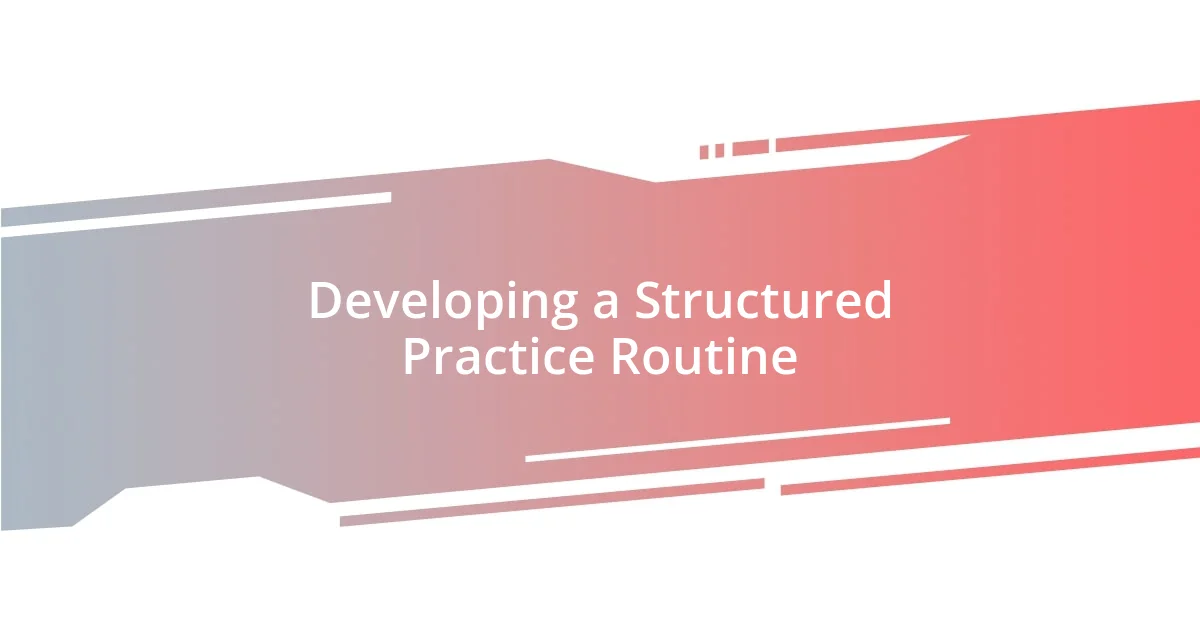
Developing a Structured Practice Routine
Developing a structured practice routine is a game changer in mastering any technique. I’ve learned that consistency is key; I remember setting aside specific times in my week dedicated purely to practice. Initially, I felt hesitant to adhere to a schedule, but slowly, it transformed my skills. By committing to regular practice, I noticed significant improvements, which kept me motivated. It’s also about finding a rhythm that suits your lifestyle, wouldn’t you agree?
I also find it helpful to break my practice down into focused segments. For example, I tend to focus on different techniques each day—one day for dynamics, another for phrasing. This method keeps things fresh and prevents burnout, a mistake I made early on when I tried to do everything in one session. How about you? Have you tried segmenting your practice to see what works best for you?
Using tools like practice journals has made a profound impact on my routine as well. Writing down what I accomplish, what challenges I face, and my emotional responses keeps me engaged and accountable. I often look back and realize how far I’ve come just by tracking my progress. It’s fascinating; this simple act not only sharpens my focus but stirs excitement for the next session.
| Element | Description |
|---|---|
| Consistency | Committing to regular practice times enhances skill retention. |
| Focused Segments | Breaking practice into specific areas prevents burnout and keeps engagement high. |
| Practice Journal | Tracking progress and emotional responses fosters accountability and reflection. |
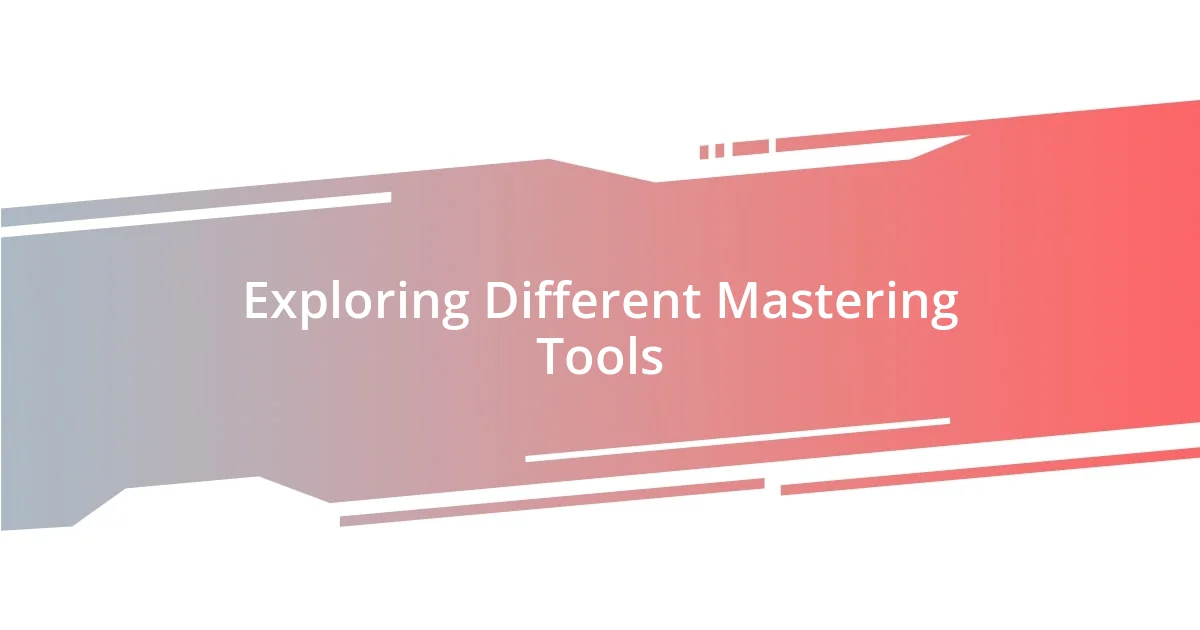
Exploring Different Mastering Tools
Exploring the landscape of mastering tools has been quite an adventure for me. When I first dipped my toes into mastering, I was overwhelmed by the sheer number of options. I started with basic software but realized that tools like iZotope Ozone offered a more comprehensive suite, significantly enhancing my control over frequency balance. Have you ever experimented with a tool that completely transformed your perspective on your work?
As I delved deeper, I began to appreciate the value of specific plugins like FabFilter Pro-L2, which helped me understand loudness while preserving dynamics. I can recall a session where I noticed that slight adjustments led to a richer soundscape, bringing my track to life. This moment made me realize that mastering is not just about making things louder; it’s about crafting an emotion that resonates. Have you experienced that magical moment where a tweak suddenly makes everything fall into place?
Another key factor in my journey was exploring analog gear versus digital plugins. I remember visiting a local studio that incorporated hardware in their mastering process, which added a warmth I hadn’t achieved with my digital-only setup. It sparked a curiosity within me to try combining both approaches, leading to some of my best work. The blend of the tactile experience of hardware and the precision of software can create a unique sonic signature. What do you think—does the tangibility of analog gear inspire you to experiment further?
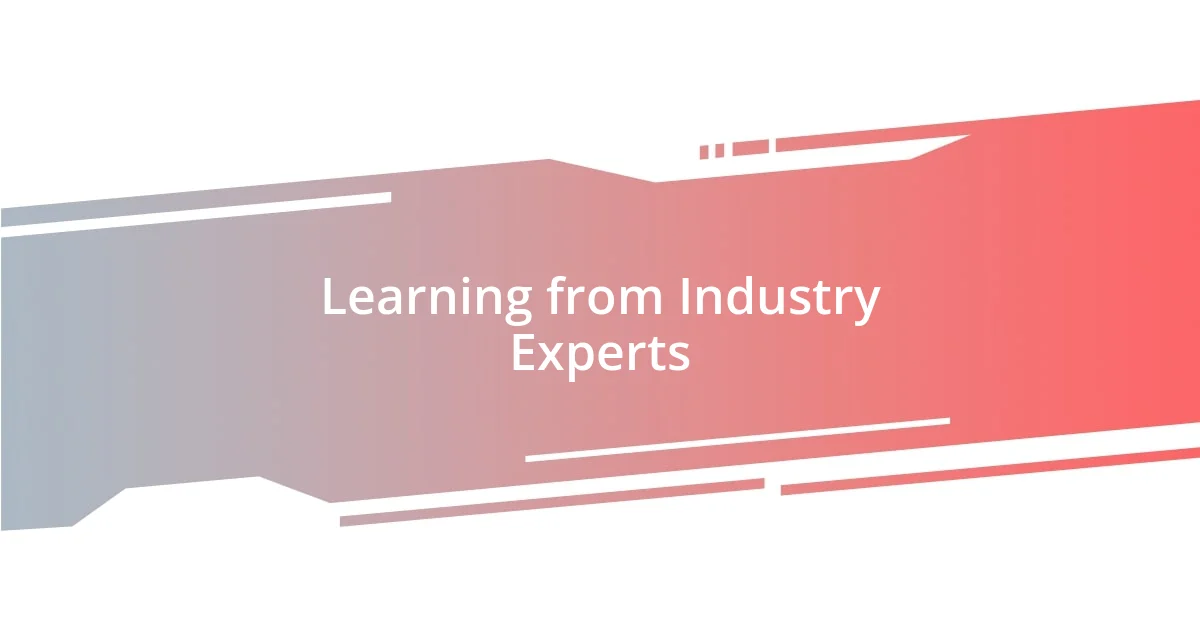
Learning from Industry Experts
Learning from industry experts has been pivotal in my journey toward mastering techniques. I still remember attending a workshop led by a highly regarded audio engineer. The way they dissected a complex mix opened my eyes to new approaches I hadn’t considered before. It was inspiring to experience firsthand how expertise can illuminate paths not easily seen as a novice.
I’ve also sought out mentorship from professionals I admire. Having regular conversations with them about their processes has expanded my understanding immensely. One mentor shared a crucial lesson: the importance of listening critically. That moment shifted my perspective; I realized that analyzing what I enjoy in others’ work can help refine my own technique. Have you ever had a similar realization during a discussion with someone more experienced?
Moreover, leveraging online resources and masterclasses has provided me with invaluable learning opportunities. I recall watching a masterclass where a producer broke down their workflow, revealing their unique decision-making process. This peek behind the curtain showed me that there’s no single route to success—everyone has their own story and methods. How about you? Have you found any gems of knowledge in unexpected places? These insights remind us that the journey is not just about technique; it’s also about embracing diverse experiences and viewpoints.
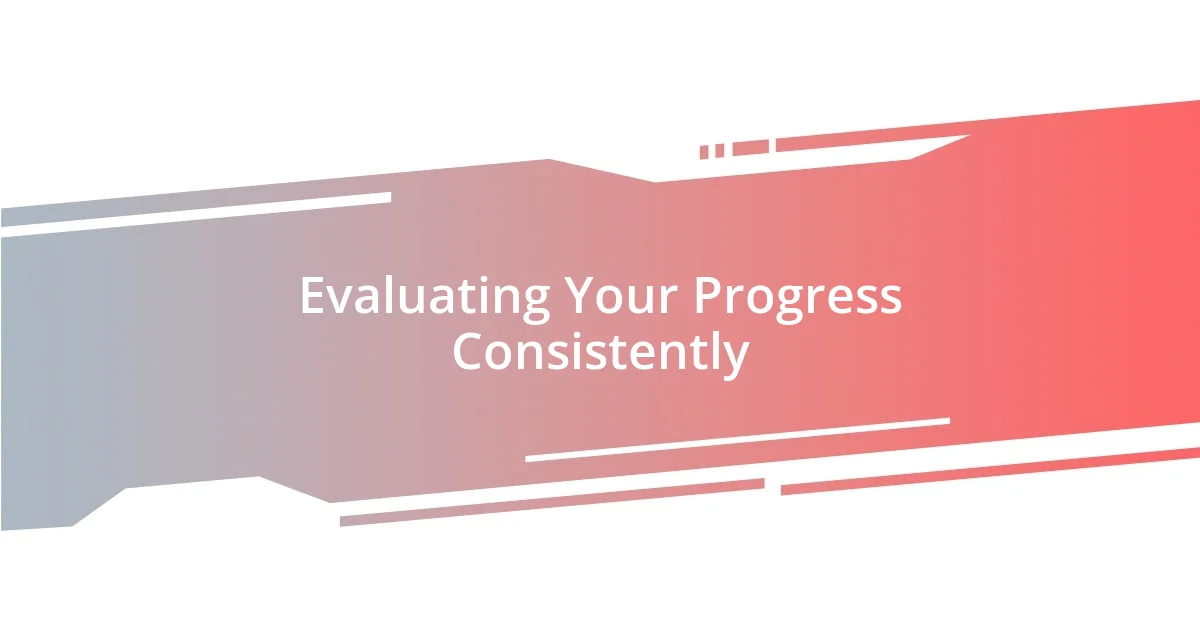
Evaluating Your Progress Consistently
To truly grow in mastering techniques, I found that evaluating my progress consistently is essential. There was a time when I didn’t take the time to reflect on my work, and it felt like I was running in circles. However, once I started to set aside specific intervals for assessment, I noticed significant shifts in both my confidence and capacity. Have you ever felt stuck, only to find clarity through reflection?
One effective strategy I’ve adopted is keeping a detailed journal of my mastering sessions. In each entry, I note what worked well and what didn’t, and I highlight the changes I implemented. This practice not only helped me track my improvements over time but also served as a reminder of the lessons learned during moments of struggle. Analyzing my past decisions creates a roadmap toward future success, don’t you agree?
Moreover, I learned to seek constructive feedback from peers, turning progress evaluation into a collaborative effort. I remember a particular session where a friend pointed out subtleties in my mastering choices that I had overlooked. This kind of insight was invaluable. How often do we overlook details that could elevate our work? It’s a reminder that even in our solitary pursuits, our growth can be enhanced by engaging with others.
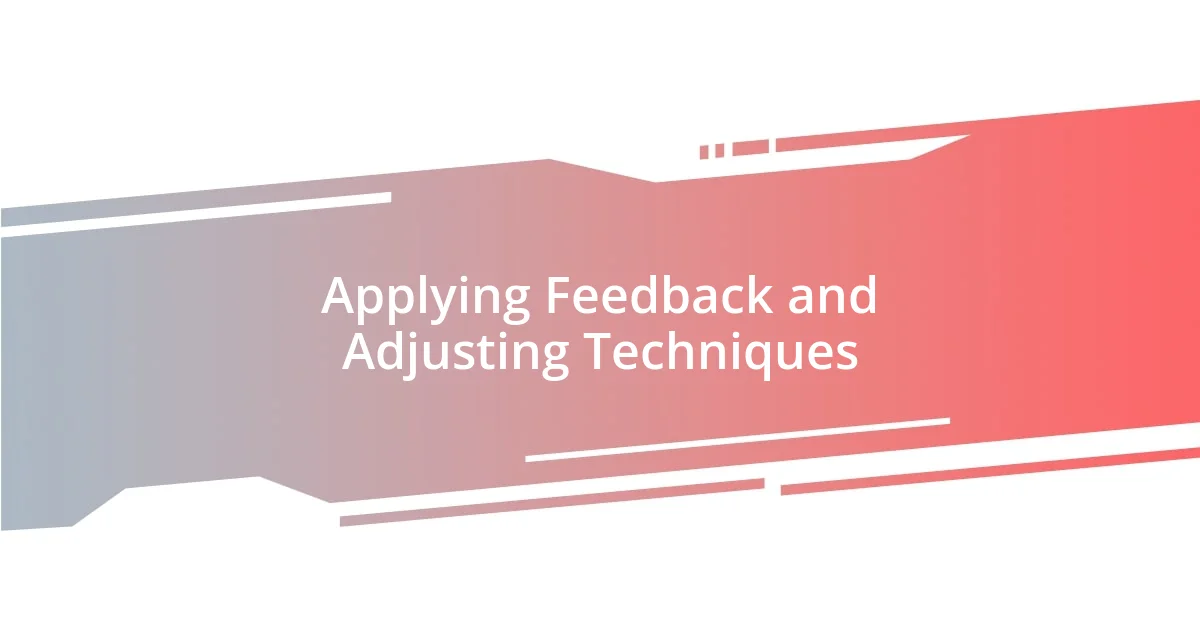
Applying Feedback and Adjusting Techniques
Applying feedback is more than just receiving suggestions; it’s about integrating those insights into my process. I remember vividly a time when I shared my work with a group of peers. Their thoughtful critiques helped me see aspects of my technique that I had been blind to, allowing me to adjust and elevate my sound. Isn’t it fascinating how outside perspectives can reveal blind spots we might never notice on our own?
After implementing feedback, I noticed a remarkable difference in my approach. For instance, I tried a technique that a fellow musician recommended, focusing more on the subtleties of dynamic range. The moment I leaned into those adjustments, I felt my tracks come alive in ways they hadn’t before. This experience taught me that adaptability is crucial; being open to revision can transform the way we create. Have you experienced that invigorating shift when feedback aligns perfectly with your artistic vision?
Adjusting techniques isn’t just a mechanical process; it’s deeply personal. I often find myself in a battle between my creative instincts and the feedback I receive. There have been occasions where I struggled with letting go of a favored method that wasn’t gaining traction. Ultimately, I learned that embracing change can be uncomfortable but is often a pathway to growth. How do you navigate your own comfort zone when faced with constructive criticism?

